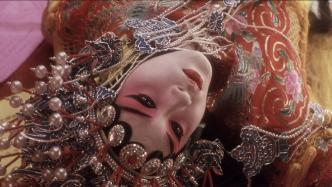
In 1993, the movie "Farewell My Concubine" won the only Palme d'Or for a mainland film at the Cannes Film Festival, and it was released in mainland theaters at the end of July of that year. On July 26 of that year, Leslie Cheung attended the premiere of the film held in Da Guangming Cinema. The crowded crowd blocked the wide Nanjing West Road, and even the glass door of the theater was crushed.
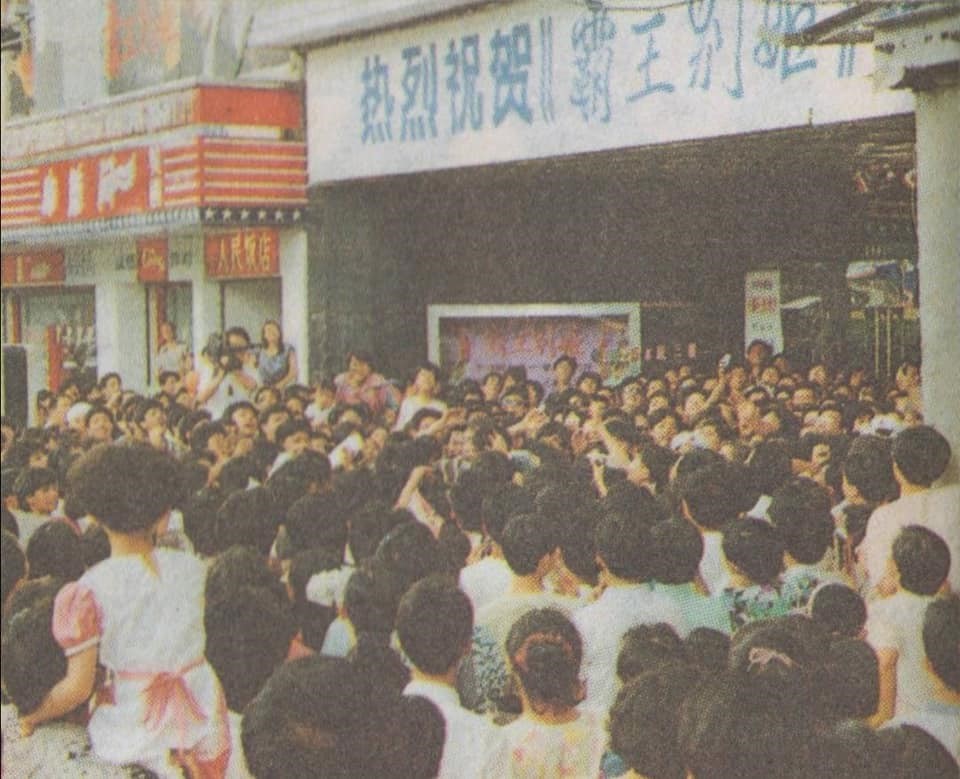
1993 Shanghai Premiere of "Farewell My Concubine"
In the following 30 years, this film, which has a score of 9.6 on Douban, has been labeled as "the best Chinese film" by countless people.
In the film, the joys and sorrows of Cheng Dieyi and Duan Xiaolou, two Peking opera actors across the ages, the tearing and persistence of ideals, the loyalty and fragility of human nature, the high spirits and humbleness of art, all turned into one out in the context of the ever-changing times. You just sing the pictures of all living beings that I appeared on the stage. The movie shows the times with ease, the wheels of the times are rolling forward, and the countercurrent in the torrent is still stirring people's hearts.
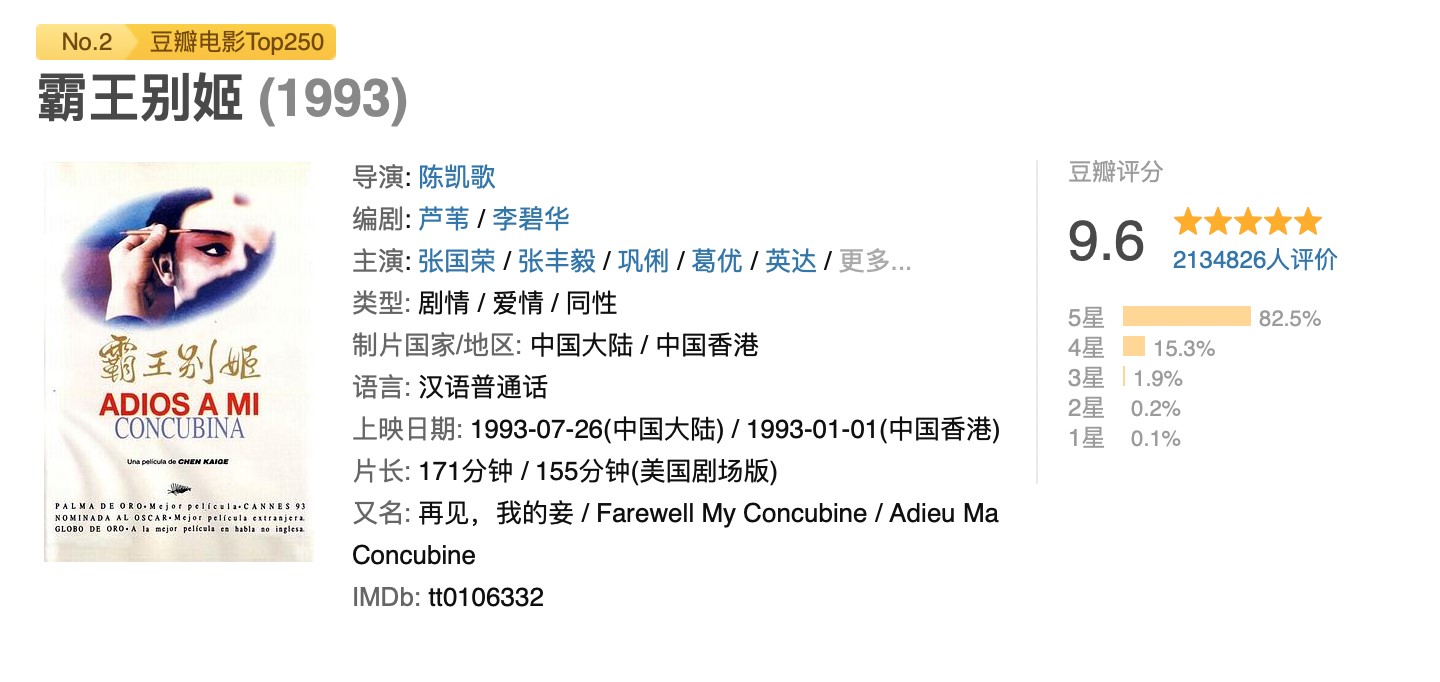
"Farewell My Concubine" has a score of 9.6 on Douban, with more than two million people giving it a rating
Most of the themes of ancient operas are inseparable from loyalty, filial piety and righteousness. Loyalty is also talked about in the movie "Farewell My Concubine", but it is more closely intertwined with other human desires, and it is also more ups and downs. At the same time, the gender awareness and concepts in the film are still not old-fashioned today. The images involving gender and sexual awareness in the theme all correspond to the visualized things, whether it is between men and women, or between "humans and ghosts". The secrets are all visualized as plots, and the various branches are intertwined and converged, and finally the era will drown everyone like a flood.
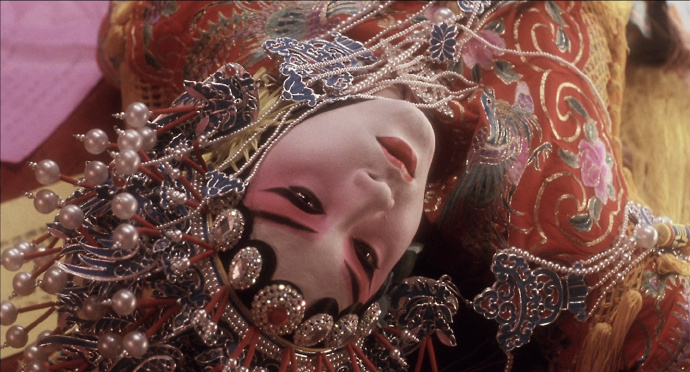
Stills of "Farewell My Concubine"
In the early 1990s, Chen Kaige saw "The Last Crazy" (directed by Zhou Xiaowen and Shi Chenfeng) abroad, and found Lu Wei, hoping that he would adapt the Hong Kong writer's novel "Farewell My Concubine" and make it into a Peking opera film. The author of the novel, Li Bihua, is from Hong Kong. The script needs to have a solid Beijing accent, and the spirit of the characters in it also needs to be reshaped with a new spiritual core. This is the adaptation that Chen Kaige asked Lu Wei to do. Lu Wei is a movie fan, and he was very interested in hearing the background of the story. He said to Chen Kaige, "You have found the right person."
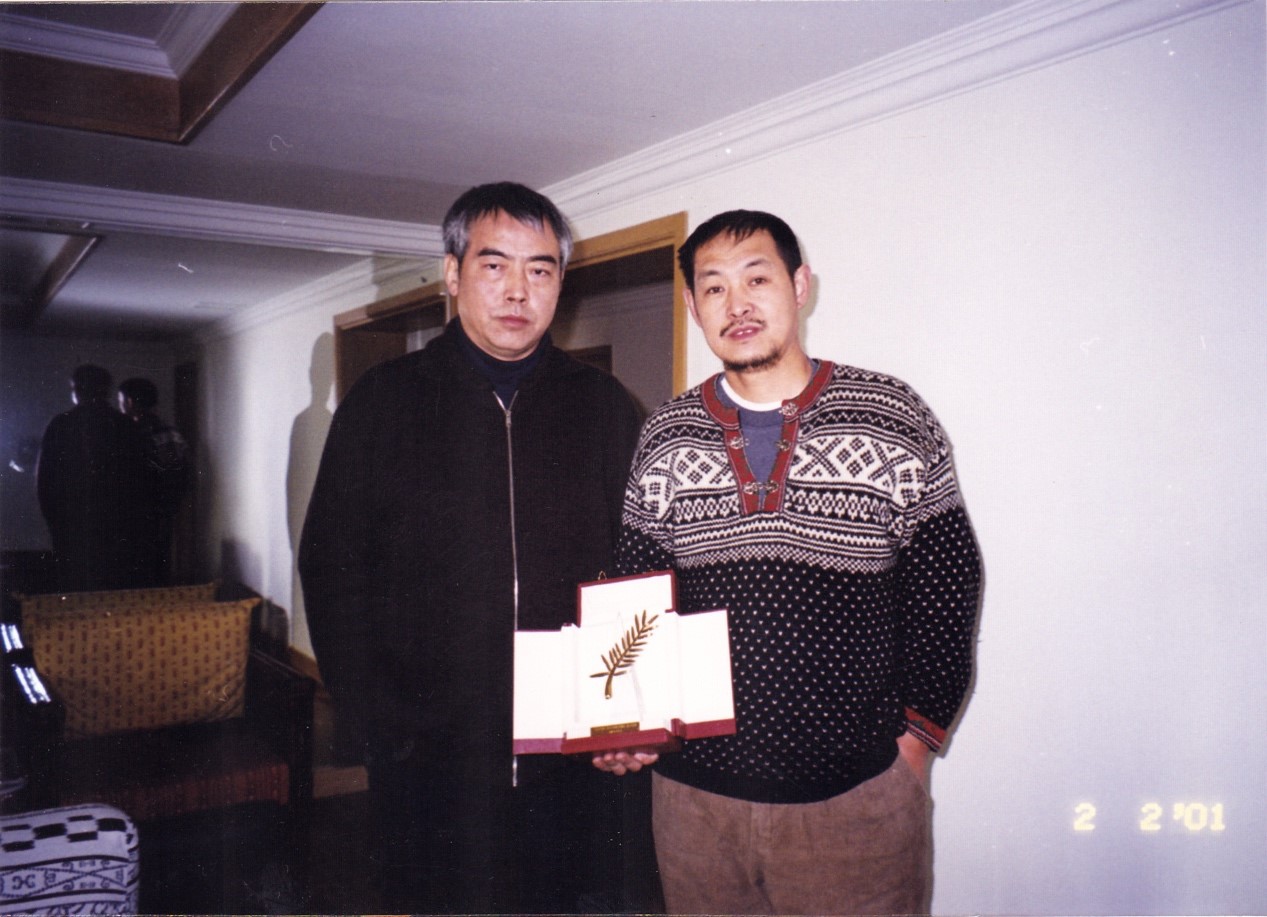
Chen Kaige and Reed
In order to prepare better, Lu Wei lived in the guest house of the National Library, read a lot of literature and history materials, and listened to Lao She's "Tea House" play recording repeatedly, soaked in the Beijing accent, and created an environment for the creation of lines.
An interesting way of cooperation is that Lu Wei only allows Chen Kaige to make comments, not to write. After the first version of the script is written and handed over to Chen Kaige, each scene is marked with "up", "middle" and "down", respectively representing "satisfaction". "" "need to exchange ideas" and "reform". In the end, the film was almost completely shot according to the second version of the script written by Lu Wei, and only two scenes were removed from 88 scenes. This is probably unique in the films of Chen Kaige, who is keen on "storytelling".
In fact, Lu Wei thought the script was too long and tried to revise another draft, but was stopped by Chen Kaige. He said, "Lu Wei, you're red-eyed."
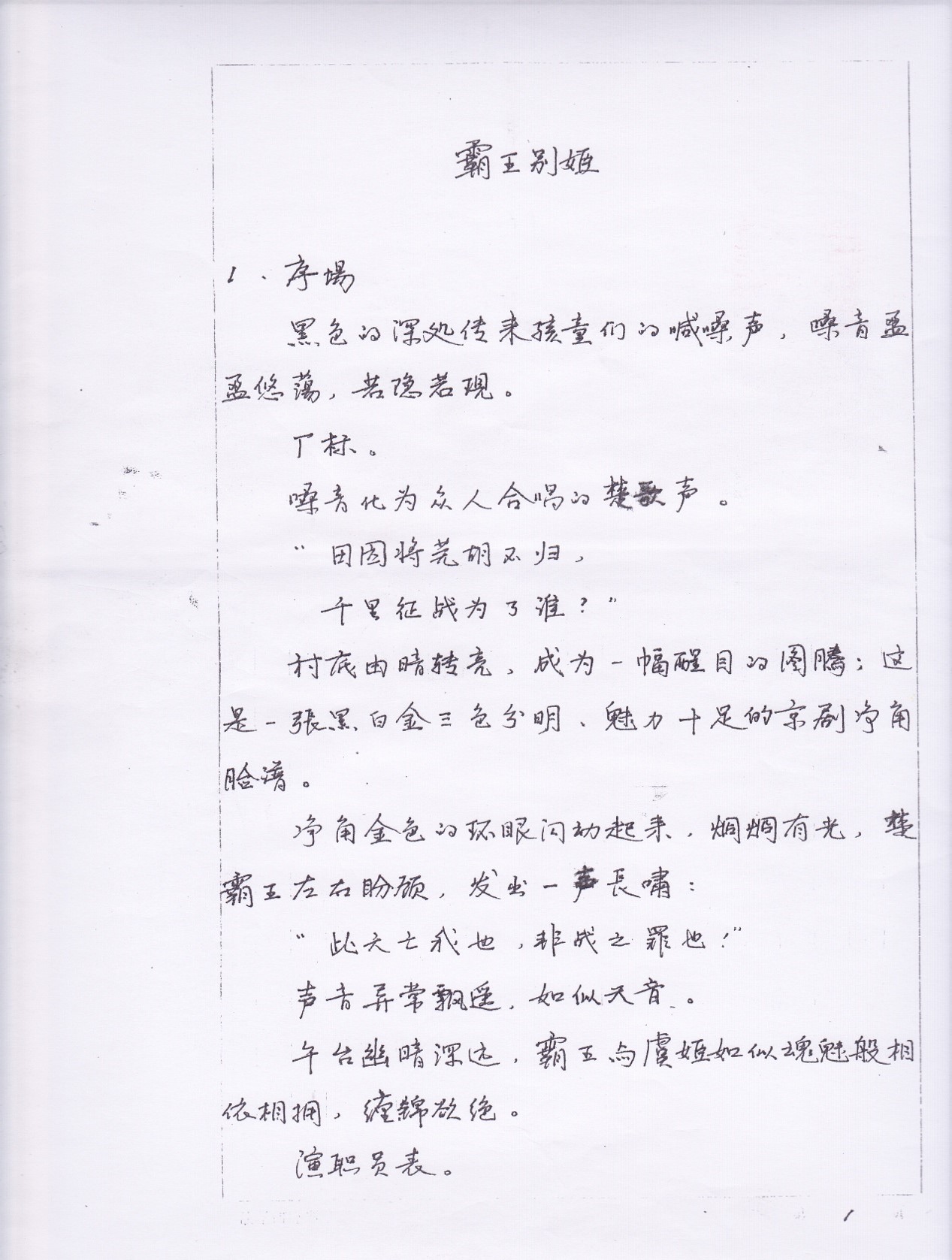
The first page of the manuscript of "Farewell My Concubine"
In the newly published book "Film Screenwriters Have No Secrets" published last year, Lu Wei and his interlocutor Wang Tianbing analyzed the script of "Farewell My Concubine" scene by scene in 100 pages. In a witty "text drawing", the creators have given a detailed first-hand interpretation of the creative motivation and ingenuity of each scene, the meticulously choreographed good intentions and intriguing potential meanings.
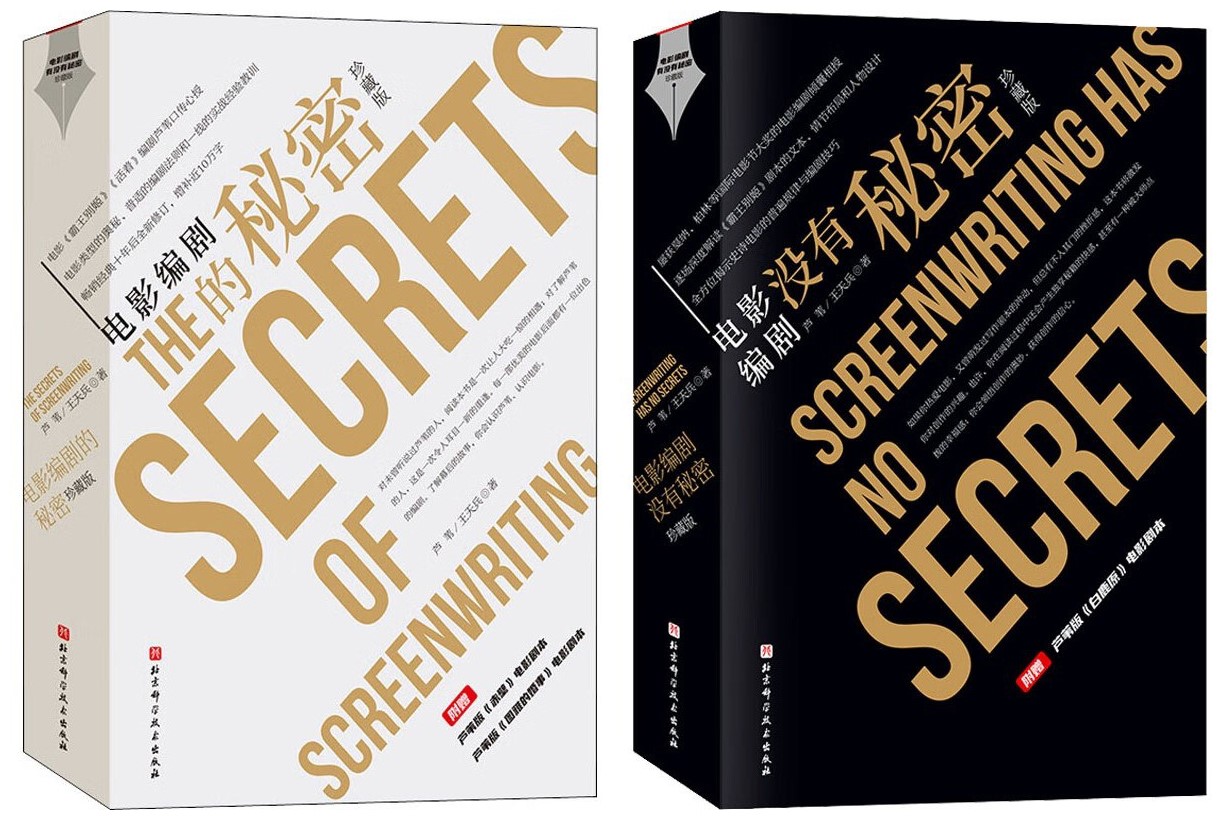
Lu Wei's new book contains a scene-by-scene analysis of the entire "Farewell My Concubine"
If you look closely at the text of "Farewell My Concubine", you can find many clues buried by the author. For example, Xiaodouzi and Xiaoshitou wandered around curiously in the eunuch's mansion. Xiaoshitou found a sword, and then the sword passed through the hands of three men, Zhang Gonggong, Yuan Siye, and Duan Xiaolou. "Overlord", Cheng Dieyi also became Concubine Yu three times, and experienced three times of parting from Overlord under the changing times, and finally died under the sword. A prop in the hands of the screenwriter presents the vicissitudes of "turning hands into clouds, covering hands into rain", which is enough to make people sigh the screenwriter's skill and understanding of drama.
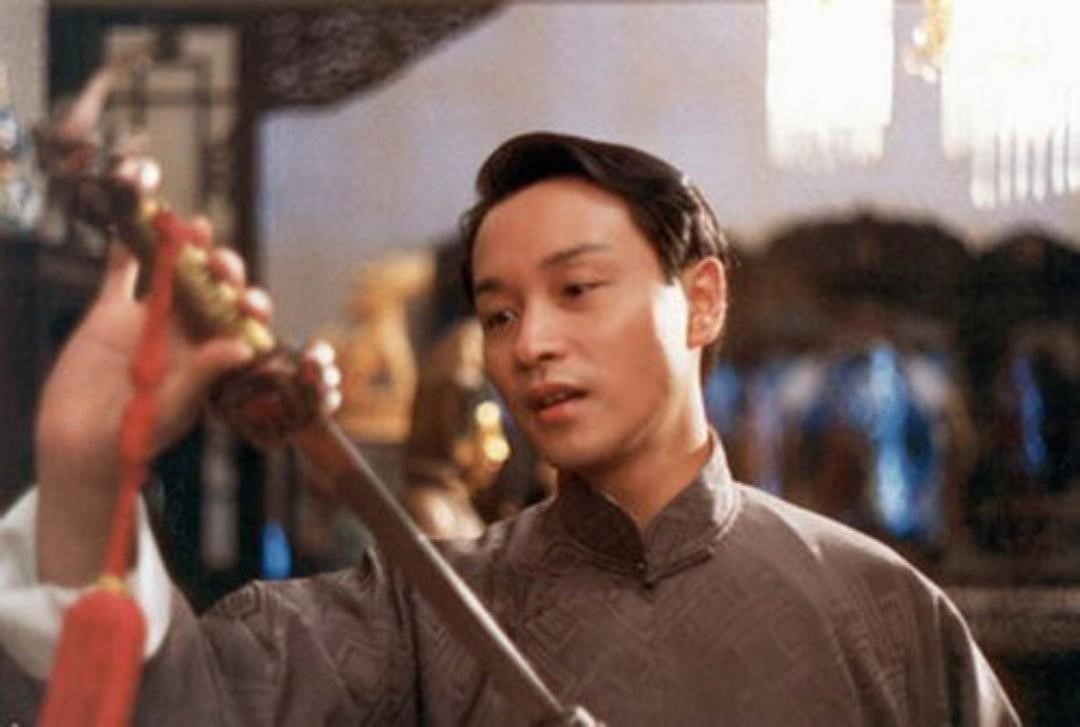
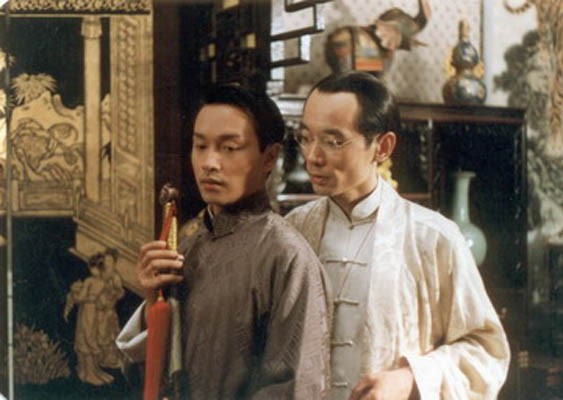
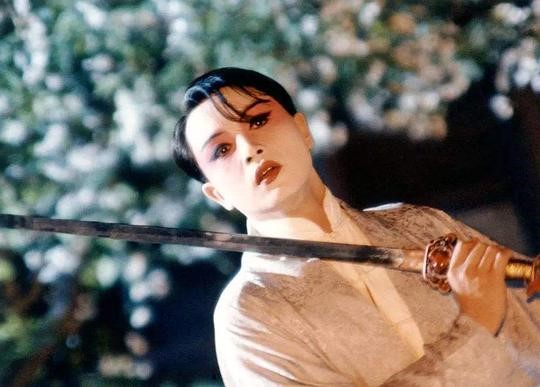
Stills of "Farewell My Concubine"
"Farewell My Concubine" invested 30 million Hong Kong dollars that year, and it was a proper big production. Lu Wei gave himself a budget of 30,000 Hong Kong dollars. In the early 1990s, this was a "huge sum" he had earned in his life with his own talent. Before that, he worked as a screenwriter at Xiying Film Studio. For a script, the draft fee was only 3,700 yuan after taxes and fees were deducted.
When writing the script, Chen Kaige would treat Lu Wei to dinner every time Lu Wei finished writing the troublesome scenes, "10 yuan can travel 10 kilometers, which is very cheap. The two of us are bent over to drink soybean juice in the small car. It was winter at that time, and we were sweating and full of passion while drinking on the side of the road where the north wind was howling."
Lu Wei recalled the creation of "Farewell My Concubine" back then, and many scenes are still vivid in his mind after many years. In addition to the steaming bean juice, there are fried sauce noodles made by Chen Kaige's father with "Xinxinmei" radish as an auxiliary ingredient; on-the-spot drawings of costumes for the characters in the movie; a 4:1 vote overturned the director's initial preference for Zunlong and chose Leslie Cheung as the protagonist Twists and turns; "Nine Deaths" before the special release that was required to "no publicity, no reporting"...Let him sum up his creative state at that time, "The only film is pure sincerity."
In "Farewell My Concubine", there is the sincerity of people who experienced that era to face the scars directly. Lu Wei revealed that the climax of the criticism scene was the personal experience of Chen Kaige's father, Mr. Chen Huaiai. It was used in the script, and later when Mr. Chen Huaiai saw this scene, he burst into tears."
"In "Farewell My Concubine", we didn't evade history, and we really showed our reflection on history, and communicated with the audience through the movie story on the screen. One of the most noteworthy qualities of this movie is that it does not flaunt What doctrine, there is nothing that needs to be instilled in others, and it does not want to educate anyone. Its values are deeply embedded in the story, that is, the care and examination of human nature. In this sense, this movie is completed. Its mission." Reed said.
Lu Wei has a famous saying, "I was very happy when I was filming "Farewell My Concubine" and "To Live". I felt that I had walked into an illusory dream. I thought this was the starting point of the fifth generation of movies, but unexpectedly, It is also the end."
30 years have passed since "Farewell My Concubine". After the reform of the theater system, the ebb and flow of capital, the impact of the epidemic, and the rise of streaming media, the environment of Chinese movies and the medium of movies themselves have undergone many changes. In this special commemorative year, The Paper chatted with the screenwriter Lu Wei about the creation 30 years ago that was hailed as "the pinnacle of Chinese film". , Talking about the creation of the year, later and now, there is still a lot to say.
【dialogue】
The director wanted Zun Long to play Cheng Dieyi at first, and I was the first to object
The Paper: When the script of "Farewell My Concubine" first came into your hands, did you realize how different it was?
Lu Wei: Because I watched "Yellow Earth" (directed by Chen Kaige), and I liked it very much at that time. It turns out that Chinese movies have been model plays for a long time. After I saw "Yellow Earth", I felt that Chinese movies could finally show their real history and the living individuals on the land with the quality of works of art. So I am also very willing to cooperate with Chen Kaige.
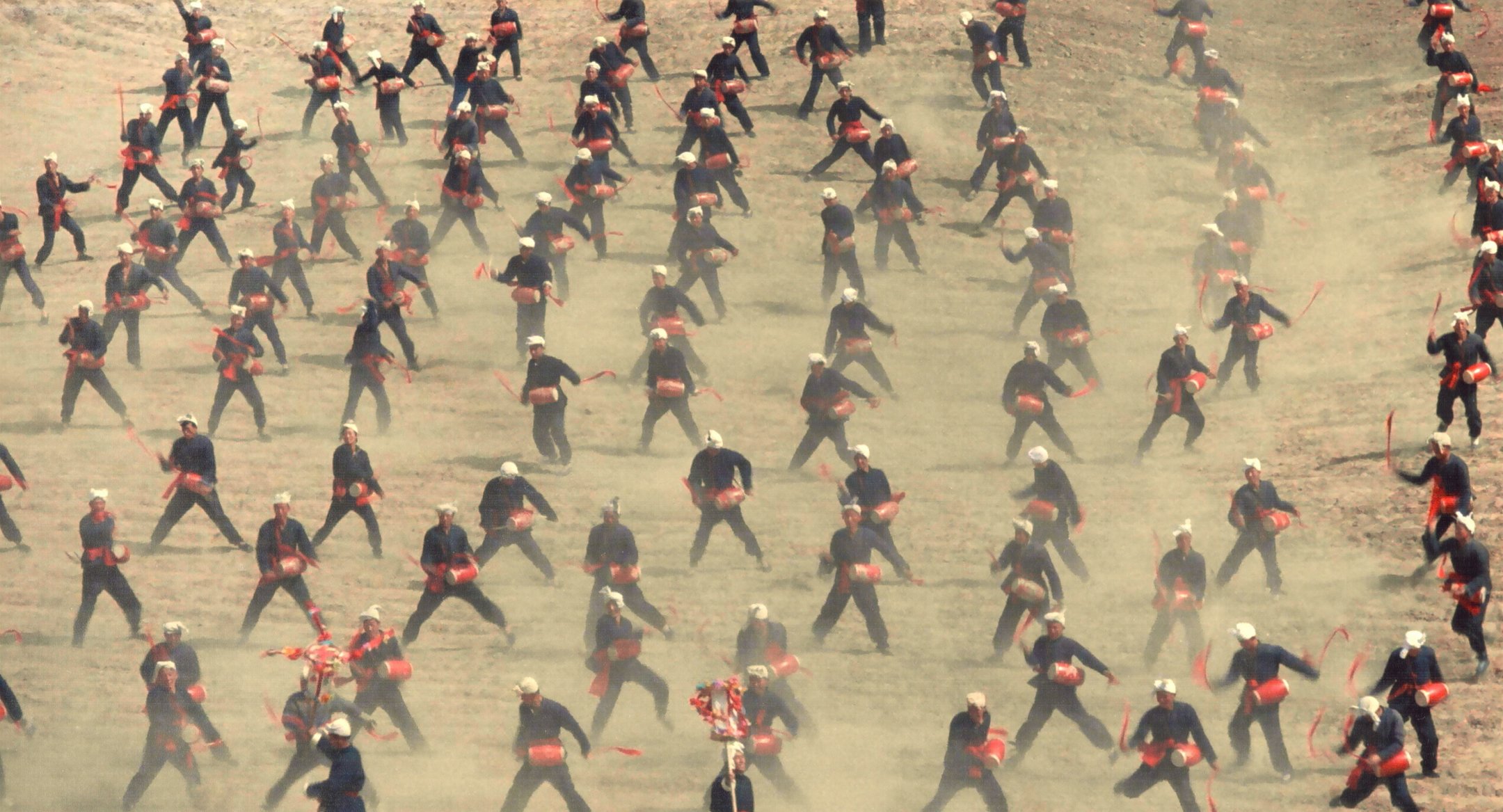
"Yellow Earth" stills
To write "Farewell My Concubine", I have a unique advantage, because I am an opera enthusiast, a fan of Kunqu opera, and I have always been fascinated by Liyuan business. Therefore, there are also large sections of Kunqu opera in "Farewell My Concubine". Of course, opera is just a carrier, and what I am most concerned about is the relationship between artists and the times.
To say that Peking Opera back then was much more popular than movies today. Movies are just one of many media, while Peking Opera was almost the only form of entertainment in Beijing back then. It had a great influence and nothing else. So the roles of Peking Opera back then were much more popular than our so-called stars today.
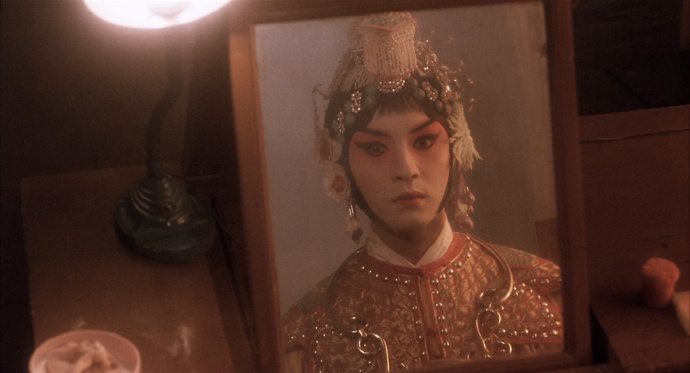
Stills of "Farewell My Concubine"
The Paper: In the eyes of many people, Leslie Cheung contributed to the charm of "Farewell My Concubine", but I read some materials and the process of choosing the actor was also very complicated. Is he the image in your mind during the writing process?
Reed: No. When he came to be our lead, I didn't even know he could act, I knew he was a singer. But he sang Cantonese songs, and I couldn't understand them, so I'm not his fan either.
As the director, Kaige liked Zunlong very much at first. Later Kaige asked me and said which one is better to watch, Leslie Cheung or Zun Long, I said I have already watched Zun Long's movie, the ancient emperor ("The Last Emperor"), can you send me one of Leslie Cheung's movie for me to watch? I watched "Rouge Button" at their house. After watching it, I firmly believed that Leslie Cheung was the most suitable protagonist.
Vegeta was more inclined to Zunlong for a long time later, because considering the overseas market, Zunlong's performance in "The Last Emperor" had a huge response at that time, and he was already an international movie star, while Leslie Cheung was only a star in Hong Kong, and he may not have overseas appeal and appeal. Reputation. But I was the first to oppose the choice of Zun Long. I said that Zun Long is not as good as Leslie Cheung. His lines are too hard, not as soft and feminine as Leslie Cheung's. these characteristics.
Vegeta and I argued about this matter two or three times, neither of us seemed to convince the other, and Vegeta was in a very good creative state at that time, he said that since neither of us could convince the other, let's hold a meeting and vote collectively. Later, the cameraman including Gu Changwei, the sound engineer Tao Jing, and the executive director voted among us, and the result was 4:1. The heroes have the same opinion. Chen Kaige also respected our opinion and settled the matter.
The Paper: Do you still remember your first impression of Leslie Cheung?
Lu Wei: It was winter when Leslie Cheung came. He didn't have any followers, so he came here very simply. It snowed heavily in Beijing in winter. He is from Hong Kong, and he was very excited to see the snow. When I first saw him in Cheng Dieyi's makeup, I was amazed. I thought it was a good choice to choose him, and I chose the right one! So as soon as he came out in disguise, I went to take a photo with him.
He is a genius in acting, and what is even more irreplaceable is his temperament. His temperament is so good. And he studied for a short time, he is really a very talented artist.
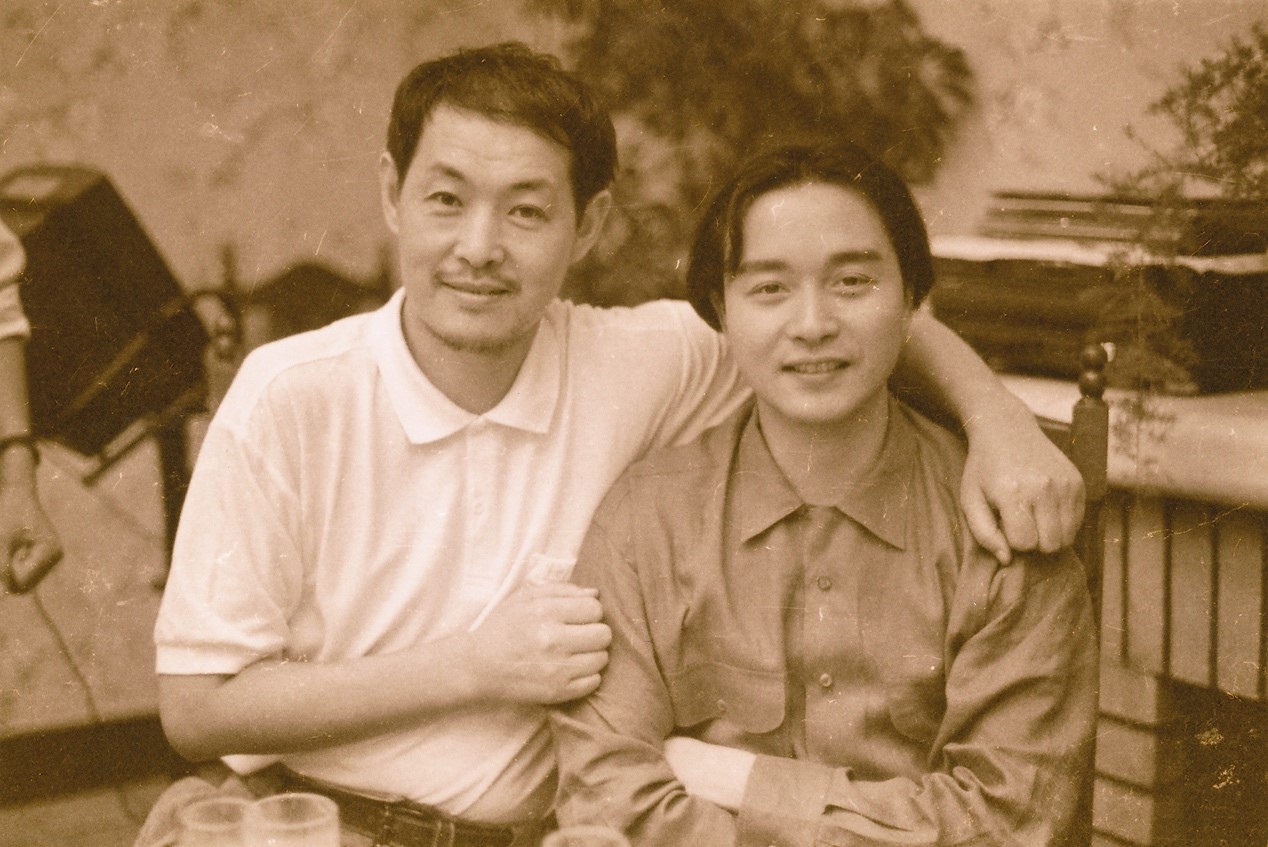
Reed and Leslie Cheung
The Paper: Regarding the opinions on casting, what else did the screenwriter participate in?
Lu Wei: Gong Li is also recommended by me. I think her way of acting is relatively broad, and she can perform that kind of prostitution. For this reason, I also went to work for Zhang Yimou. I said, "Lend Gong Li to us." Zhang Yimou was not quite reconciled, he said, do you still want to make art films that don't make sense? He didn't want Gong Li to make that kind of film. I said no, I said that we will surprise you by making this movie this time, and then he specially brought Gong Li to the group.
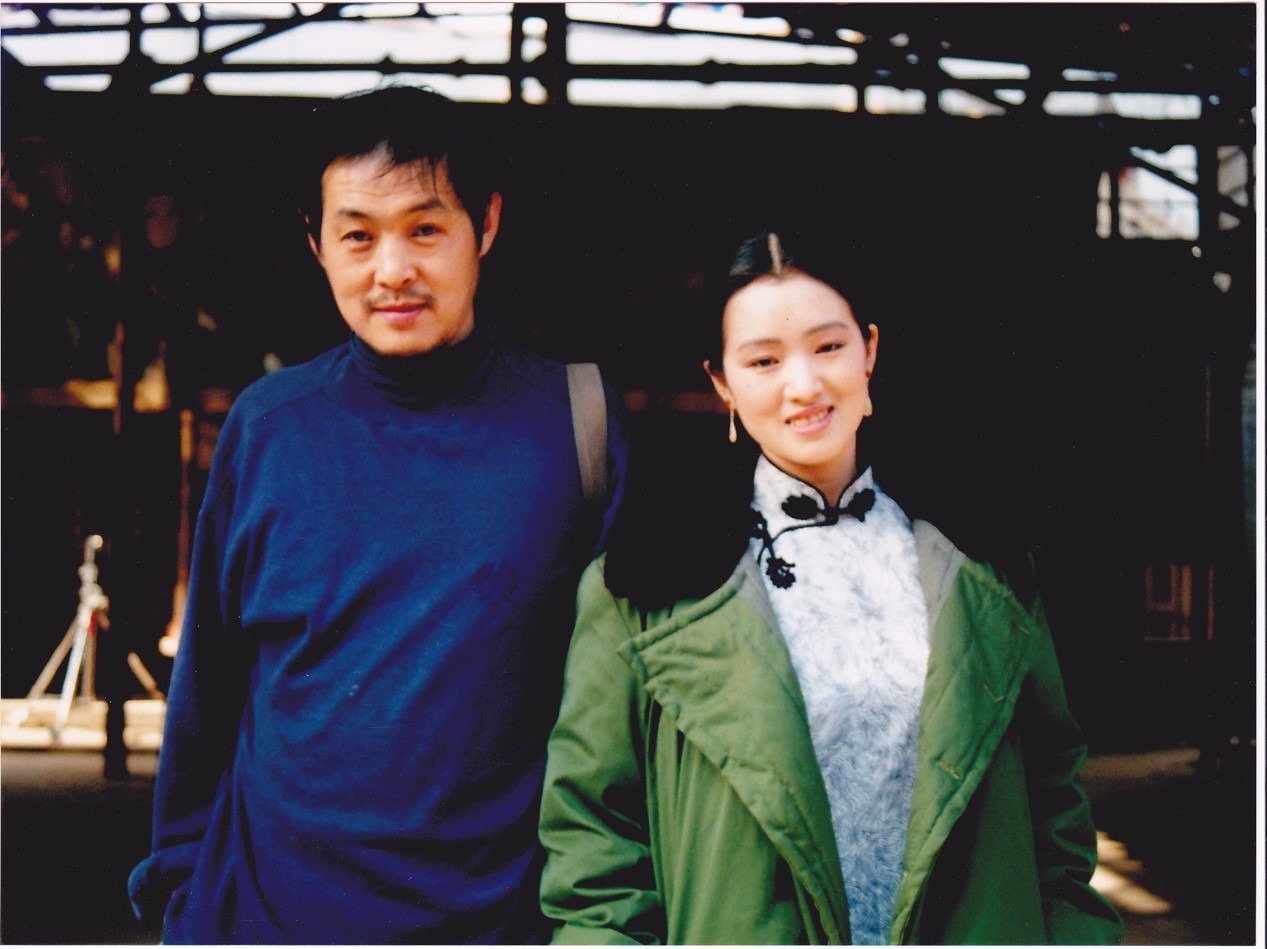
In 1992, Lu Wei and Gong Li were in the studio of "Farewell My Concubine"
The Paper: During the actual filming process, did you still participate in or visit the set, or temporarily modify something?
Lu Wei: I do. During the preparation, the script has already been written. If you have time, Triumph said you should communicate with them, talk about it, and clarify that era. I drew some pictures for them, which is more work for those who are capable, because I have art skills, and I was originally a film artist. So I drew a lot of clothing patterns for them, what styles and characteristics they wore at that time, because I checked a lot of information at that time, and I drew them for them. Look at the clothes worn by the teacher and the clothes worn by the eunuch. The teacher wears glasses inside. These are also drawn by me. I like to study history, and the movie also wants to restore that era most faithfully.
The theme of the novel is submission, the theme of the film is rebellion
The Paper: When you first started writing the script, you knew that "Farewell My Concubine" was a "big production" at the time. Was there any pressure on the market response? How is the pressure at that time different from the situation screenwriters face now?
Lu Wei: Yes, it was a big investment. Tens of millions of RMB was a huge amount of investment back then. I told Chen Kaige at the beginning, "This investment has suddenly become a giant. How can we spend so much money? "Later I learned that Leslie Cheung's remuneration alone was 1 million US dollars, which was an astronomical figure at that time. So we have to consider that we can no longer make art films, and we must follow the path of commercial films in terms of style and narrative. But to follow the road of commercial films, we must maintain the essence of art films. So we determined that the plot density of a movie must be very high. Although its temperament is artistic, its narrative method is melodramatic. You can see that it is buckled one after another, one buckle after another.
Their Hong Kong company sent an executive producer here, there were probably two or three people, and the investment company often came to inspect the team, but they did not interfere with us at all, they were very modest and friendly, so this cooperation left a deep impression on me. I think the creative atmosphere of that play is really good. So we have no pressure, we are only responsible for the artistic part, and film art is under our control.
The Paper: How do you find the "type" in these seemingly almost entirely literary elements?
Lu Wei: I first wrote a character list, and I also made a character analysis prompt, which is to analyze "Farewell My Concubine" from the type: first, it is a classic structural model; second, it has a relationship between two men and one woman. , is a type of love triangle relationship; third, it has the type of biography; fourth, it has the factor of a play within a play, the characters in life are integrated with the characters on the stage, and finally Cheng Dieyi proves it with his life up to this point. Of course, there is also the space setting of the epic film. Types will give you a crutch to walk you through the structure.
The scenes of Chinese main theme movies are very big. But what movies look at is not the scenes, but the characters, so we have to spend 99% of our energy on portraying the characters, as long as we have money, we can shoot scenes. When a leaf falls, one knows autumn in the world. The beauty is that you show an era through a small character.
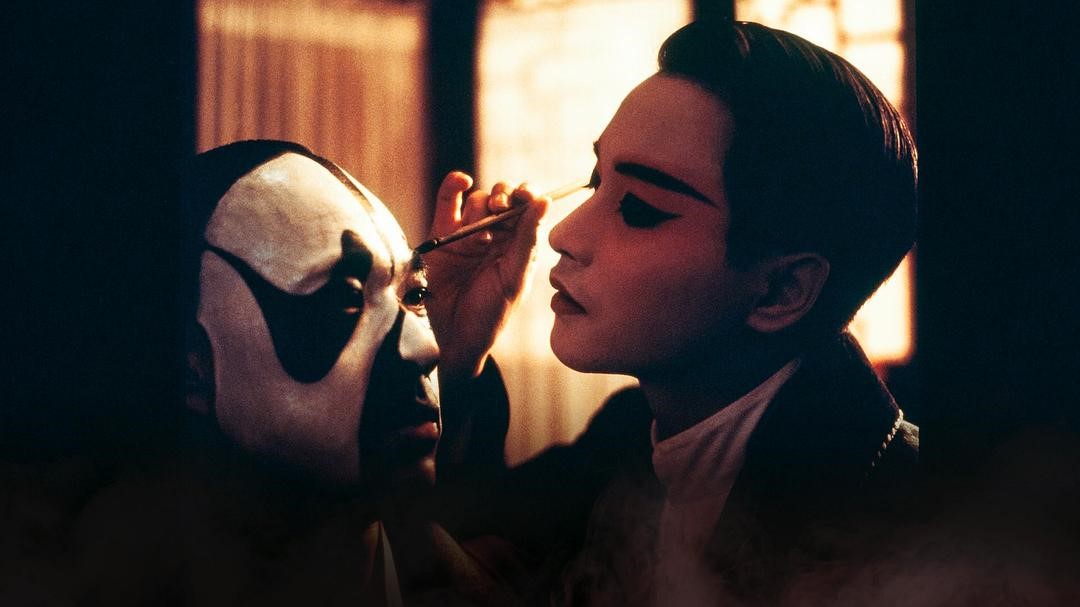
Stills of "Farewell My Concubine"
The Paper: This kind of commercial awareness was actually quite rare at the time? At that time, the film screenwriters in the system should not have much market awareness?
Lu Wei: From the very beginning of my film making, I was linked to commercial films. The factory always told me that if you are a screenwriter or an artist, the factory will only vote 1 million for you, but your box office must get back the cost. Said to double the income, the task given to us by the factory manager is like this, so I have developed a good concept of investment.
Therefore, from the selection of materials to the determination of the story and the determination of the characters, this "economic task" must be completed. Our first two films were not bad, and both made a lot of money, so I also know the charm of box office and business, so I have self-consciousness. So at the beginning of "Farewell My Concubine", the first question that Vegeta and I had was the genre, which must meet its commercial goals.
The Paper: What major changes have been made in "Farewell My Concubine" from the original novel to the movie? Many of the characters on the branch line, including Cheng Dieyi's mother, Zhang Gonggong, Yuan Siye, and Xiaosi when they appeared on the stage, are very moving with just a few strokes. How did these characters come into being?
Lu Wei: Except for Cheng Dieyi and Duan Xiaolou who are characters in the novel, most of the other characters are recreated by us, which are not in his novels, such as Master Guan and Xiaosi, which are basically not in the novel people. Xiaosi is a shadowy character, and there is no plot of his subsequent betrayal in the novel. We repositioned and sorted out this character. Chen Kaige said that calling you here will "make a revolution on the script, we will start from scratch, and turn a romance novel into a classic movie", this is our goal.
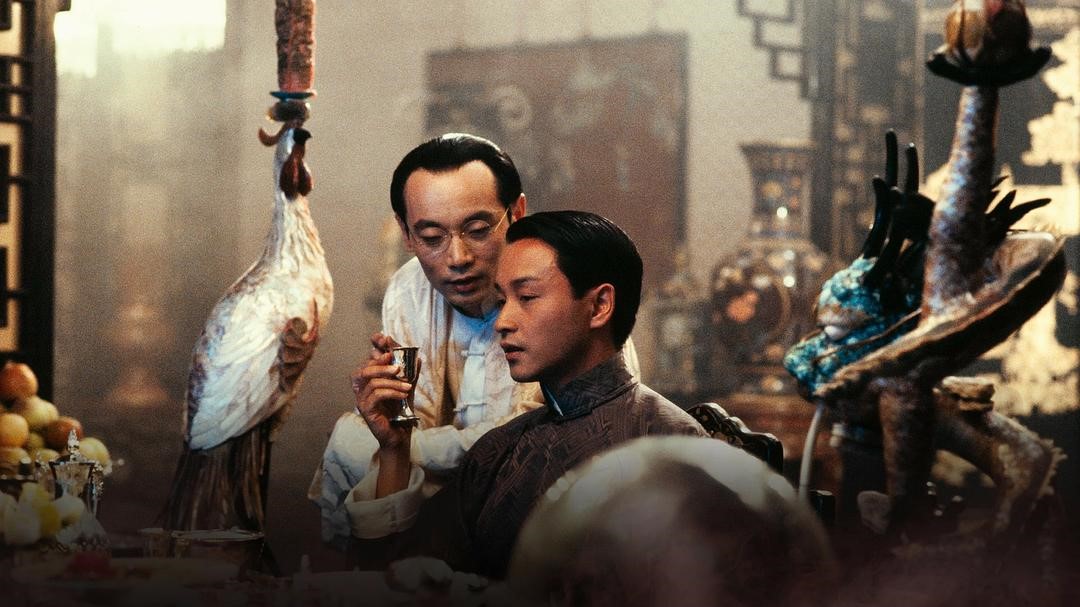
Stills of "Farewell My Concubine"
If you have read the original novel of "Farewell My Concubine", you will find that it is very different from the content of the movie. It is essentially a romantic secular story, and it ends with a happy reunion. Cheng Dieyi finally got married, married a secretary as his wife, and finally visited Hong Kong, and everyone was happy. It may also be the ending after some people made choices in the past. It is also in line with reality, but it is not Cheng Dieyi in the movie.
The theme of the original novel of "Farewell My Concubine" can be said to be obedience and submission. The theme of the movie is unyielding and resistance. Chen Kaige didn't like the structure of the novel at that time, and I didn't quite accept it either. The novel provides the relationship between the characters, the background of the times and the main time period, but we have to redesign and create everything else.
The Paper: Later, there were many interpretations. For example, Duan Xiaolou is a fake concubine, Siye and Master Guan are real concubines; Is it the "variations" of "Farewell My Concubine" in different scenes and times, among which the various intertextuality and comparisons are intentionally designed?
Lu Wei: I am not conscious of this kind of consideration. I only know that there must be some kind of "centripetal force". It should have a centripetal force. I always say that everything is to create the character Cheng Dieyi. , you can bring all the other characters to life.
Everyone held back their energy and wanted to show their thinking about the fate of a generation
The Paper: Today, if we have some themes that touch on a relatively grand history or have a critical perspective, everyone seems to be naturally more vigilant and cautious. When creating, what was the attitude of the main creator when facing some acute issues?
Lu Wei: Everything else is a means, only our thinking about history and the fate of this generation is our theme. Why did we make this movie? What does this movie mean to us? I tell you never doubted, steadfast, as if this was a self-evident thing. It seems that at this point, I, Chen Kaige, and the main creator at the time, we all hold back our energy, we must write down our understanding of history, it is our perspective, not someone else's business, we are looking for a Values, I think this is self-evident when we cooperate, so I miss this cooperation very much now, everyone is really in the same heart, and the pursuit is also very consistent.
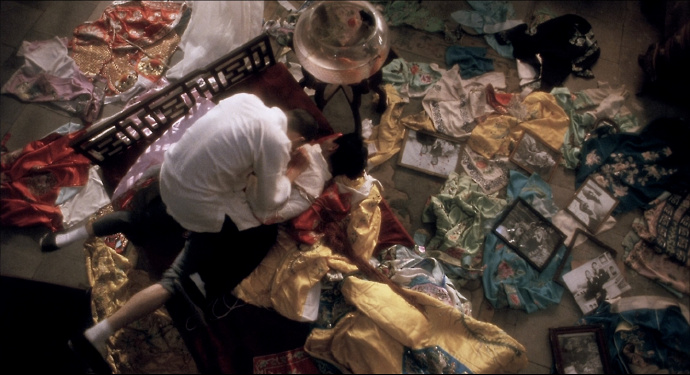
Stills of "Farewell My Concubine"
The Paper: It's hard to imagine that this movie could be released at that time.
Lu Wei: Actually, this movie was shot down several times, "three ups and three downs". At that time, Xu Feng (producer) was ready to give up the mainland market. But we always feel that we should be able to fight for it. Later, relevant parties said that the film could be released, but it could not be promoted, and it could not participate in Chinese film festivals, and it would be fine to do some limited screenings.
So the scope of this film's "release" was not extensive, but it was reported by many media, because its influence overseas was too great. At that time, it was the first time for a Chinese to win the Cannes Award. Very exciting.
The Paper: So at that time, did you feel that you were doing something really awesome?
Lu Wei: Anyway, I know we are "walking a tightrope", because the final result is likely to be "banned", but we think it is worth it, as long as we make a good movie, we are willing to participate in this matter.
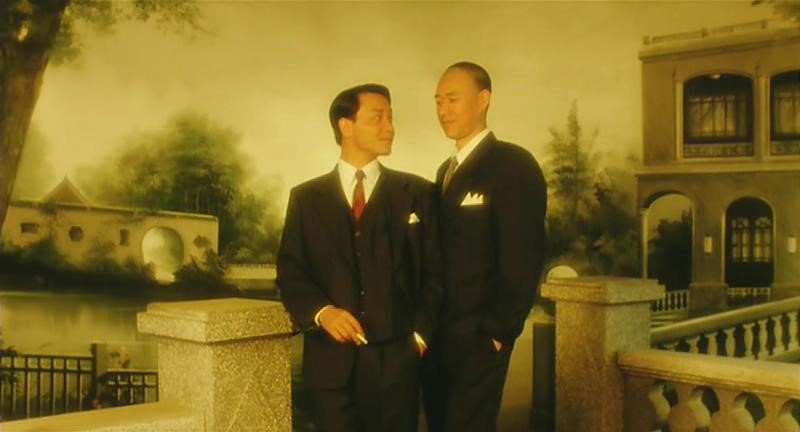
Stills of "Farewell My Concubine"
Successfully killed our generation
The Paper: Many people still say that "Farewell My Concubine" is Chen Kaige's best work. How do you evaluate the position of this work in your creative pedigree? Was the state of writing more passionate then than it is now?
Lu Wei: Among the films I have written and produced, this film has the greatest influence, the largest investment, and the most successful combination of various creative forces.
But from the perspective of the script, I think it is a good script, and it can be regarded as a script that can be sold, and many scripts I wrote later are not inferior to it in terms of level, and some are even better than it, because after all I Still maturing.
If scoring, 85 to 90 points. I think Lu Wei is very normal and healthy. When I was writing the script, I was in a state of highs and lows. At that time, I was probably in a relatively excited state, because I knew that the film could be shot immediately after writing, and I was quite excited.
I think the reason why I can persist in writing until today is because I still have passion. Passion never dies. Passion has also always been a theme in my writing. If I want to feel that I have no passion someday, I won't write.
The Paper: "Farewell My Concubine" won the first Palme d'Or for a Chinese film. How did you feel at that time?
Lu Wei: After winning the award, there was a celebration party. I remember that director Teng Wenji came to organize the meeting. It was the first time I appeared on this stage. Chen Kaige also said why are you so shy, I said I have never been on stage.
At that time, I didn't think the Palme d'Or was so good, I just thought it was an affirmation to me and our pursuit of quality in the creative direction, and we should continue along this road. I don't take the Palme d'Or seriously. I think it's not surprising that there are Palme d'Or every year, but good movies and good stories are unique.
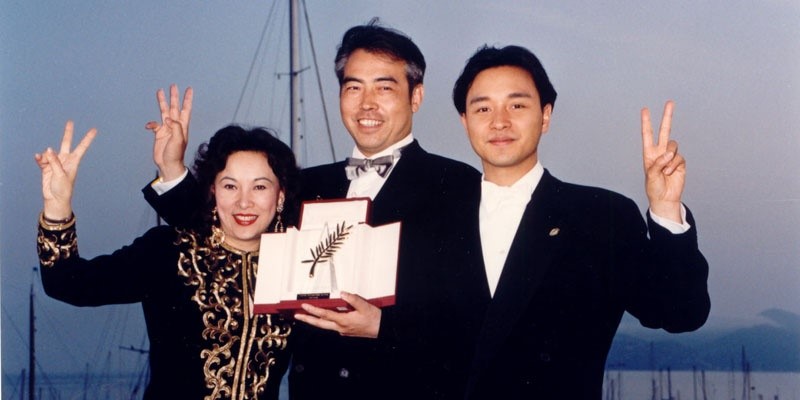
"Farewell My Concubine" won the Palme d'Or in the main competition unit of the 46th Cannes Film Festival
The Paper: But looking back, it was too good, and there will be no more after that. Chen Kaige has said many times that the success of "Farewell My Concubine" is a combination of cause and effect of the times, and it is difficult to reproduce. What do you think?
Lu Wei: From then on, we in the entire Chinese film industry will be "disappointed". The reason is very simple. If you want to make you lose your mind, you will successfully kill our generation.
I myself feel that I was in a state when I was filming "Farewell My Concubine". After the success, the positive and motivated state at that time disappeared. Later, when I went to Beijing, Chen Kaige sent a car to pick me up. I saw, oh my god, an extended Cadillac. Now that you've said that, you'll understand, the whole atmosphere has completely changed.
We became celebrities all of a sudden, and became "powerful" all of a sudden. The kind of positive attitude of civilian creation is no longer there. I think this is really a negative loss brought to us by "Farewell My Concubine". Later, they talked more about investment and box office, and they never returned to the same creative atmosphere as before.
In fact, I asked Chen Kaige at that time that we could discuss the shortcomings and deficiencies of the film together someday, and he said definitely. But thirty years have passed, and we have never had such an opportunity.
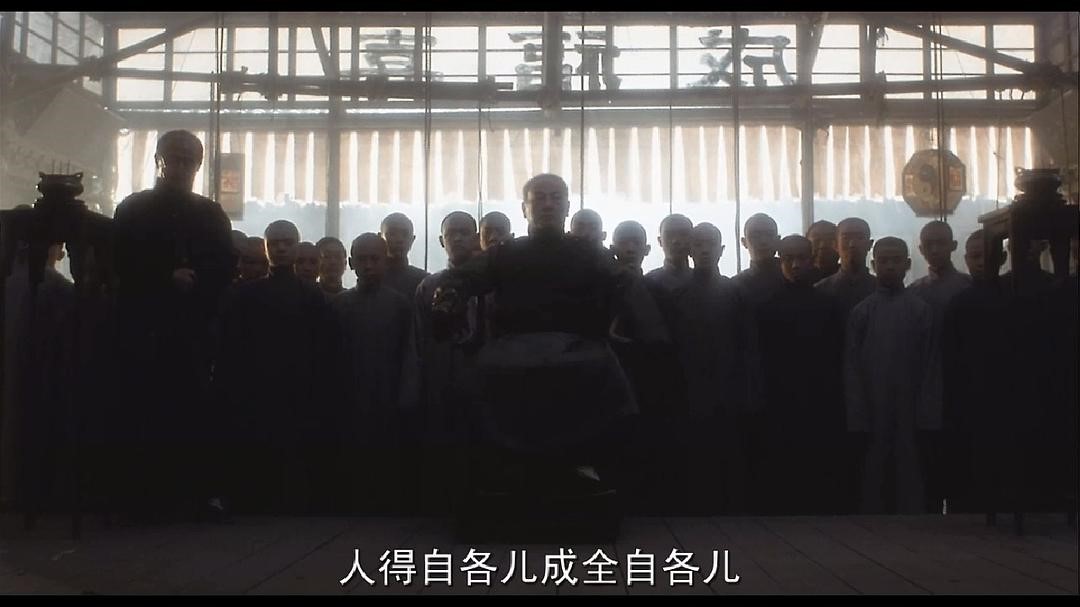
Stills of "Farewell My Concubine"
The Paper: But later, the younger directors were not overwhelmed by success, and gradually lost their former vigor and ambition. Especially the narration of the bigger vision and the big era, it seems that the Chinese "epic" movie has been broken, and I haven't seen it for many years.
Lu Wei: It's very different, because Chen Kaige and Zhang Yimou stood at a height that young people can no longer stand on. They went to the mountains and went to the countryside, first went deep into life and then entered the creation, and caught up with the process of thinking from imprisonment to liberation. The previous height of this generation is difficult to achieve after the sixth generation. But Chen Kaige and Zhang Yimou have only stood at this height for a period of time, but they have indeed stood on the follow-up directors, although there are also talented young people emerging, I rarely see this perspective.